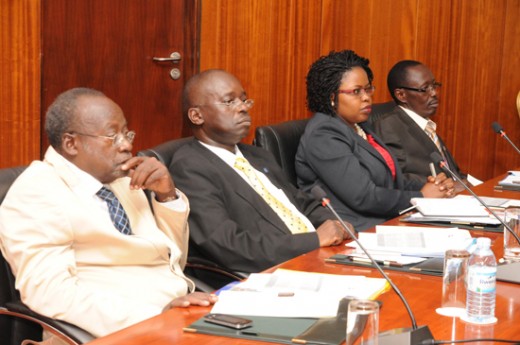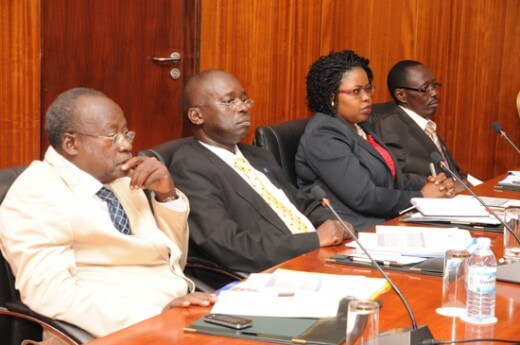Kampala – March 24th, 2014
Government of Uganda is taking the steps necessary to launching a one stop electronic trade clearance system, a computerised scheme that saves time, shoe leather and money. Through the Ministry of Trade, Industry and Cooperatives (MTIC), a High Level Task Force (HLTF) has been constituted composed of Ministers, Leaders of key institutions and private sector players involved in the facilitation of trade, to agree on national governance and institutional arrangements for adoption and implementation of the electronic single window system (E-SW) in Uganda and consider the proposed roadmap for its implementation. The private sector fully supports the implementation of the E-SW and recently signed a memorandum of understanding (MOU) with the Government of Uganda through MTIC.

Announcing the composition of the team at a HLTF committee meeting held at the Serena Hotel facilitated by TradeMark Africa, the Minister of Trade, Industry and Cooperatives Amelia Kyambadde said a broad range of stakeholders from government and private sector would be consulted to get the necessary data and information needed to operationalize the system which will make it possible for traders and transporters to submit the data needed to declare goods admissible to the authorities at border control using a single portal. These include the Ministry of East African Affairs (MEACA), The Ministry of Finance, Planning and Economic Development (MoFPED), Ministry of Works and Transport (MoWT), Uganda Investment Authority (UIA), Uganda Revenue Authority (URA), Ministry of Energy (MoE), National Information Technology Authority (NITA), Uganda National Bureau of Standards (UNBS), DHL, Private Sector Foundation Uganda (PSFU) and airlines among others.
Kyambadde continued “once fully implemented, the E-SW system will link government, clearing agencies and local traders easing/speeding up international trade. It will decrease the time the process usually takes by 50 per cent and will complement other national and regional trade facilitation initiatives such as Integrated Border Management (IBM) and One-Stop- Border Posts (OSBP) which will soon be coming online”.
“Adoption of the E-SW SYSTEM is an integral part of the national and regional strategy of using trade as a tool for the promotion of prosperity. The HLTF committee will play a pivotal oversight role in the implementation of the programme and as TradeMark we will support them along the way to ensure they achieve their objectives” noted Allen Asiimwe the Country Director of TradeMark Africa.
Commenting on the potential impact that the implementation of the system will have on the private sector, Hon. Sendawula the Chairman of the Private sector Foundation for Uganda said “this is a welcome initiative which will undoubtedly reduce the cost of doing business through the time saved at border crossings and other customs points. Our members are very much encouraged by this and other efforts Government and its respective agencies have introduced aimed at facilitating the growth of trade.”
Find out more about Trademark East Africa.
NOTES FOR EDITORS
Dennis Kashero
Communications Director, Trademark East Africa
Tel: +254 20 4235221
Phone: +254 731 564 786
Email:[email protected]
Website: www.trademarkea.com
Mr.Silver Ojakol
Commissioner, Ministry of Trade and Industry
Tel: 256 701 408 740
Email:[email protected]
Website: www.mtic.go.ug
Source: TradeMark Africa(TMA)
TradeMark Africa (TMA) is an aid-for-trade organisation that was established with the aim of growing prosperity in East Africa through increased trade. TradeMark Africa (TMA) operates on a not-for-profit basis and is funded by the development agencies of the following countries: Belgium, Canada, Denmark, Finland, the Netherlands, UK, and USA. TradeMark Africa (TMA) works closely with East African Community (EAC) institutions, national governments, the private sector and civil society organisations.















